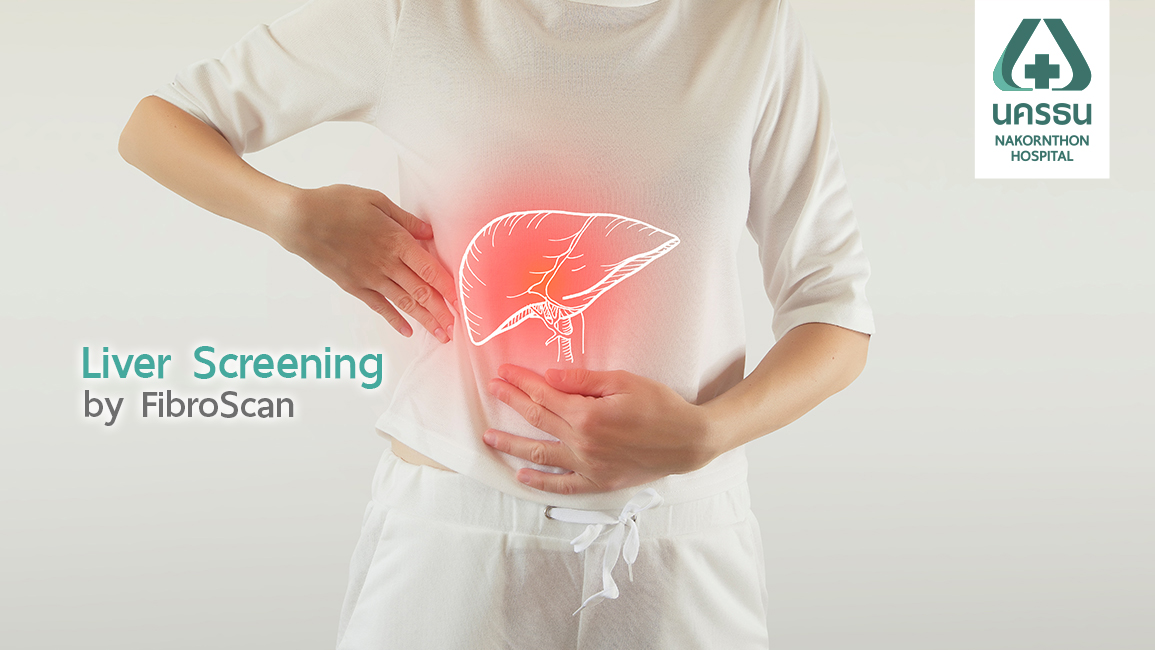Cirrhosis - Symptoms, Treatment
Center : Gastrointestinal and Liver Center
Article by : Dr. Sombun Rungjiratananon

Aside from fatty liver, there are other causes of cirrhosis. Which is more common is the hepatitis B virus, Hepatitis C and alcohol or alcohol abuse. It is the main cause of liver cirrhosis. When cirrhosis occurs, there is a high risk of developing liver cancer. People with cirrhosis at first rarely show symptoms. Because the liver is the largest organ in the body. If you start to see symptoms of cirrhosis more than 80 percent of the liver has been lost.
Choose to read by topic:
- What is Cirrhosis
- Cirrhosis Stages
- Types of Cirrhosis
- Signs of Cirrhosis
- Causes of Cirrhosis
- Diagnosing Cirrhosis
- Cirrhosis Treatment
- Cirrhosis Complications
- Cirrhosis Complications
- How to Prevent Cirrhosis
- FAQ Related to Cirrhosis
- Cirrhosis Conclusion
- Why must come to Nakornthon
- Online Consultation
What is Cirrhosis
Cirrhosis is the result of persistent destruction of liver tissues from various causes. Chronic hepatitis, liver fibrosis without proper treatment, liver eventually becomes cirrhosis. The most common cause is alcoholic cirrhosis. Cirrhosis due to hepatitis and fatty liver disease causes chronic hepatitis and may progress to cirrhosis.
Cirrhosis Stages
- Stage 1: is the stage when fat accumulates in the liver. No symptoms or inflammation has yet occurred in the liver.
- Stage 2: is the occurrence of liver inflammation. Without treatment and over a period of more than 6 months, the inflammation may progress to chronic hepatitis.
- Stage 3: Inflammation is severe and persists until fibrosis forms in the liver and is destroyed and turned into a membrane.
- Stage 4: The liver cells are severely damaged. As a result, the liver can no longer function normally. Cirrhosis can lead to liver cancer and can cause liver failure.
Types of Cirrhosis
Alcoholic Cirrhosis
Alcohol-related cirrhosis is scarring of the liver caused by the formation of fibrous tissue to replace the damaged liver cells. Cirrhosis cannot be cured, even after stopping alcohol. In the early stages of cirrhosis, there may be no symptoms at all, except for blood test results indicating abnormalities, or there may be malaise, loss of appetite, vomiting, and as cirrhosis progresses, these symptoms may appear, such as jaundice, swollen abdomen and legs, smaller muscles, etc.
Hepatitis Cirrhosis
Infection with hepatitis B and C leads to abnormal liver function, an enlarged liver, and the possibility of developing cirrhosis. How crucial it is will depend on the amount of virus acquired and the patient's baseline strength. The most common symptoms include fatigue, tightness under the right rib cage, muscle pain, joint pain, nausea, vomiting, loss of appetite, diarrhea, dark urine, jaundice, and yellow eyes.
Signs of Cirrhosis
Signs and Symptoms of cirrhosis:
- Ascites, fatigue, yellow eyes, jaundice, thin but bloated abdomen.
- In men, there may be symptoms of hair loss.
- Physical examination reveals that yellow eyes, yellow body, thumbs up.
- Enlarged veins in the chest or shoulders, like a spider web a small capillary.
- Some people have water in the stomach, which can easily cause an infection.
- Some people may have complications, such as vomiting blood.
Causes of Cirrhosis
The main cause of cirrhosis is fatty liver. This causes chronic hepatitis and can progress to cirrhosis. The causes include hepatitis B virus, hepatitis C and alcohol consumption. There are also other risk factors, such as:
- Abnormal iron accumulation in tissues.
- Wilson's disease, which is caused by excessive copper accumulation in the liver.
- Obstruction of the bile ducts. Reflux of bile into the liver, leading to destruction of the liver and consequent cirrhosis.
- Ingestion of certain medications over a long period of time.
- Exposure to certain toxins
- Multiple congestive heart failure
Diagnosing Cirrhosis
Cirrhosis Blood Test
This test is used to measure liver function, including:
- ALT (Alanine transaminase) or SGPT (Serum glutamate-pyruvate transaminase)
- AST (Aspartate transaminase) or SGOT (Serum glutamic oxaloacetic transaminase)
- ALP (Alkaline phosphatase) It is usually tested along with ALT and AST to detect serious disease such as bile duct cancer, bone cancer or obstruction of the bile duct
- Hepatitis B virus (HBsAg, Anti-HBs, Anti-HBc)
- Hepatitis C infection (Anti – HCV)
FibroScan
Fibroscan is a method that uses ultrasound waves with a special probe on the right side of the abdomen to determine the amount of fat and fibrosis in the liver. The patient feels only small waves transmitted through the skin. The examination is not painful and takes only 10-15 minutes. The results can be obtained immediately after the examination, and the test results can be used to make a positive diagnosis and assess the risk of patients with fatty liver disease or fibrosis, whether it is close to cirrhosis or not.
Cirrhosis Treatment
In the absence of cirrhosis but is an early chronic inflammation or early cirrhosis, you should try to avoid risk factors such as stopping drinking; and turn to exercise and diet. If you have hepatitis B or hepatitis C, should receive treatment properly. These can help reduce the risk of developing cirrhosis. In addition, to preventing more cirrhosis as follows:
- All patients with cirrhosis should be tested for hepatitis A and B; and should be vaccinated if the patient is not yet immune to the virus.
- Patients with cirrhosis should receive adequate rest, complete meal with the right amount of protein
- If there is swelling in the ankles and abdomen, salt and salty foods should be limited.
- Avoid eating raw foods, especially seafood.
- See a doctor for follow-up treatment regularly.
Cirrhosis Complications
- Membranous tissue will obstruct the flow of blood to the liver. As a result, the portal vein that connects the intestines and the liver to have higher pressure. This causes the blood that is supposed to flow to the heart to flow through other blood vessels instead of the liver. As a result, the blood vessels in the lining of the stomach and esophagus dilate.
- If there is slow bleeding it can cause anemia.
- At risk for severe bleeding
- Cirrhosis of the liver can also lead to liver failure
- Can lead to nephrotic syndrome due to liver disease and brain dysfunction
- Increase the risk of liver cancer
How to Prevent Cirrhosis
- Stop behaviors that destroy health.
- Abstain from alcohol and take more care of yourself
- Get enough rest.
- Control your weight so as not to exceed the normal BMI.
- Check liver function for abnormalities.
- Hepatitis B vaccination to prevent liver damage.
FAQ Related to Cirrhosis
Is cirrhosis cancer?
Cirrhosis is not cancer. However, if cirrhosis is not treated, it can lead to liver cancer in the future. Besides, if you are infected with hepatitis B and C, this causes chronic hepatitis and an increased risk of liver cancer. In addition, alcohol consumption and hepatitis are all major causes of chronic inflammation of the liver which leads to other serious complications: crucial hepatitis, cirrhosis, liver failure, and liver cancer.
Is cirrhosis fatal?
Cirrhosis is not immediately fatal. It leads to further scarring of the liver and progressive deterioration of liver function. Eventually, liver failure and life-threatening.
Is cirrhosis a hereditary disease
Cirrhosis is not an inherited disease but by infection with the hepatitis B virus and hepatitis C virus, which can be transmitted from the mother to the fetus by blood transmission, leading to chronic hepatitis, in which this type of virus gradually destroys liver cells until cirrhosis can occur.
Cirrhosis Conclusion
When the liver has cirrhosis, the liver cannot function normally. This leads to complications such as jaundice, ascites, confusion, easy bleeding, esophageal aneurysms, liver failure, liver cancer, and death. In particular, regular liver exams can help reduce the risk of cirrhosis.
Why must come to Nakornthon
At Nakornthon Hospital, we committed to distinction in preventing, diagnosing and treating wide range of illnesses related to the gastrointestinal tract. With therapeutic technology and standardize equipment, our physician and well-trained expertise are here to provide personalized care at all time. Gastrointestinal and Liver Center, Nakornthon Hospital can provide one stop service aside with many facilities such as endoscope service, bowel preparation room, recovery room. With personalized care, we try our best effort to keep our patient safety as priority. The diagnosis and treatment have performed to minimize the risk factors for complication and reduce the length of hospital stays.
Online Consultation
Free of Charge
Article of Gastrointestinal and Liver Center






